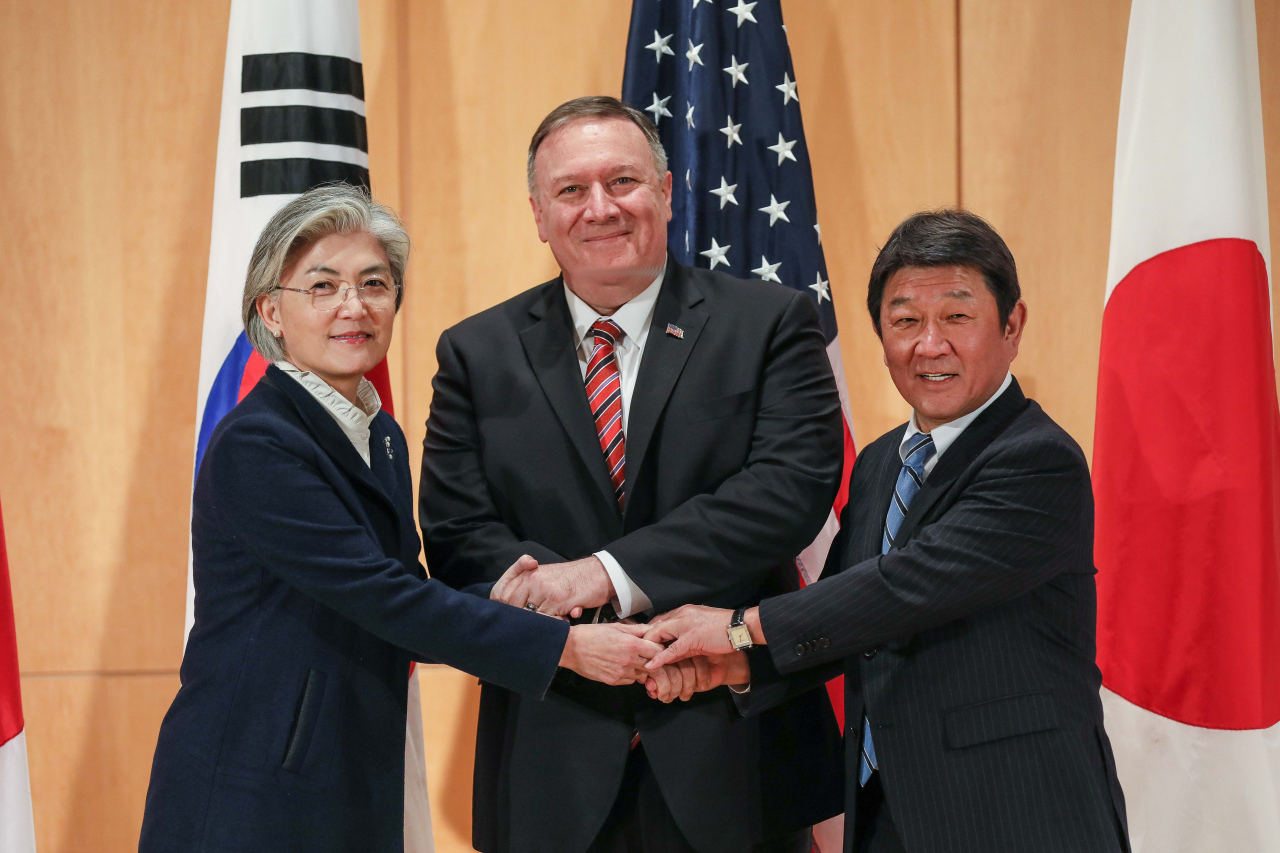 |
(Yonhap) |
The top diplomats of South Korea, the United States and Japan held trilateral talks on the margins of a security forum in Germany on Saturday to discuss cooperation over stalled nuclear talks with North Korea, the new coronavirus outbreak and security in the Middle East.
Foreign Minister Kang Kyung-wha and her US and Japanese counterparts -- Mike Pompeo and Toshimitsu Motegi -- met on the sidelines of the annual three-day Munich Security Conference in Munich, which will run through Sunday.
"The three ministers had consultations on ways for trilateral cooperation over North Korea and the nuclear issue, and over pending issues and the situation in the region and beyond," Seoul's foreign ministry said in a press release.
"They also exchanged views on the recent spread of COVID-19 and pending regional and global issues such as the situation in the Middle East," it added.
Their talks came amid stepped-up efforts by Seoul, Washington and Tokyo to halt the disease's spread, as it has not only posed health risks to their citizens but also caused disruption to global supply chains, potentially undermining the global economy.
The US and its two core Asian allies have also been beefing up cooperation to address high tensions in the volatile Middle East stemming from a confrontation between Washington and Tehran.
"The ministers have agreed to continuously explore areas and methods of cooperation among South Korea, the US and Japan in the region and on the international stage," the ministry said.
The US State Department said that Pompeo, Kang and Motegi reaffirmed close cooperation on the North and discussed a coordinated response to the coronavirus outbreak and other global security concerns.
"They also emphasized the importance of the US-ROK and US-Japan Alliances to security and prosperity as a key part of the Indo-Pacific Strategy, adding further that trilateral cooperation is essential to ensuring stability and peace in the region," it added in a press release.
ROK stands for South Korea's official name, Republic of Korea.
Kang, Pompeo and Motegi last held a trilateral meeting in San Francisco last month.
After the three-way talks, Kang held brief one-on-one talks with Pompeo.
At the talks, the two sides agreed to continue efforts to "smoothly" address alliance issues such as ongoing negotiations over the sharing of the cost for stationing 28,500 American troops in South Korea, the ministry said.
A Seoul official said that Kang and Pompeo agreed to encourage their negotiation teams and work together for a mutually acceptable deal on the cost-sharing.
"The two ministers assessed the active high-level exchanges between the two countries following their talks in San Francisco in January and agreed to maintain close communication at each level," the ministry said in a press release.
They may also have discussed Seoul's push for individual trips to the North and other inter-Korean cooperation projects as part of efforts to enhance cross-border relations and help resume stalled nuclear talks between Washington and Pyongyang, observers said.
Also in Munich, Kang and Motegi held bilateral talks to discuss a wide range of pending issues, including joint efforts to address a protracted row over Japan's export restrictions and its wartime forced labor.
Kang called for Japan to take "tangible, earnest" steps to retract its export curbs seen by many as political retaliation for
2018 Supreme Court rulings that ordered Japanese firms to compensate victims of forced labor during Japan's 1910-45 colonization of the Korean Peninsula.
The two sides apparently did not specifically mention Seoul's November decision to temporarily put off the expiry of a military intelligence-sharing pact with Japan called the General Security of Military Information Agreement (GSOMIA).
Seoul has recently stressed the "temporary" nature of the decision in an apparent move to pressure Japan to retract its export curbs amid the limited progress in related government talks.
"The temporary nature of that decision is something that we have always communicated to the Japanese side," a Seoul official said, hinting the issue was not thrashed out at the talks.
Kang also used the talks to call for Tokyo's cooperation in ensuring the safety of 14 South Koreans aboard a Japanese cruise ship in Yokohama, which has been under quarantine since earlier this month after the COVID-19 virus was detected in a person who disembarked from the ship in Hong Kong last month. (Yonhap)




![[Herald Interview] 'Trump will use tariffs as first line of defense for American manufacturing'](http://res.heraldm.com/phpwas/restmb_idxmake.php?idx=644&simg=/content/image/2024/11/26/20241126050017_0.jpg)

![[Health and care] Getting cancer young: Why cancer isn’t just an older person’s battle](http://res.heraldm.com/phpwas/restmb_idxmake.php?idx=644&simg=/content/image/2024/11/26/20241126050043_0.jpg)

